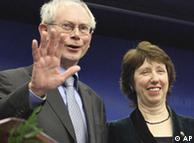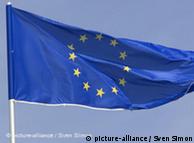European Union | 01.12.2009
The EU's reform treaty comes into force
On Tuesday, citizens across the European Union woke up to what is meant to be a new EU, one with more transparency and efficiency at home and more political clout abroad. But after years of wrangling with skeptical voters and politicians, the EU has a treaty that rewrites all the previous treaties and agreements, starting with the 1957 founding Treaty of Rome, into one document.
The Lisbon Treaty creates the post of EU president, to be filled by former Belgian Prime Minister Herman Van Rompuy, and a high representative for foreign and security affairs, to be filled by British Baroness Catherine Ashton. The two roles are the most immediately visible effects of the treaty and are meant to answer former US Secretary of State Henry Kissinger's famous question, "Who do I call when I want to call Europe?"
 Bildunterschrift: Großansicht des Bildes mit der Bildunterschrift: Van Rompuy and Ashton now represent the face of the EU
Bildunterschrift: Großansicht des Bildes mit der Bildunterschrift: Van Rompuy and Ashton now represent the face of the EU
The European Parliament, made up of the only EU politicians directly elected by EU voters, gains new responsibilities including the field of justice and security. Citizens themselves also have the opportunity to propose new EU laws if they collect at least one million signatures.
"The Treaty of Lisbon puts citizens at the center of the European project," EU Commission President Jose Manuel Barroso said in a statement. "I'm delighted that we now have the right institutions to act and a period of stability, so that we can focus all our energy on delivering what matters to our citizens."
The treaty also establishes a European charter of fundamental rights, although Britain, Poland and the Czech Republic have all secured full or partial opt outs.
The long road to Lisbon
What kind of reform document the EU needed has been the subject of heated debate since 2001 when the then-15-member-strong bloc determined it would grow significantly over the next decade. The EU now has 27 members and several other countries have lined up to join.
One of the continual criticisms of the Lisbon Treaty has been that it will create a super-state and infringe upon the sovereignty of individual member nations. Initially EU leaders wrote a constitution, but this document was rejected by voters in France and the Netherlands. The Lisbon Treaty was meant to be a compromise reform and was signed by national leaders in Lisbon, Portugal in October 2007.
But the navel-gazing continued after Irish voters rejected this text in June 2008. Top-level negotiations and a strengthened "Yes to Lisbon" campaign convinced voters to approve the treaty in a second round of voting this October.
The new EU era will be officially welcomed by EU leaders in Lisbon on Tuesday night. Ashton and Van Rompuy are set to attend.
hf/AFP/dpa
Editor: Chuck Penfold

Comments